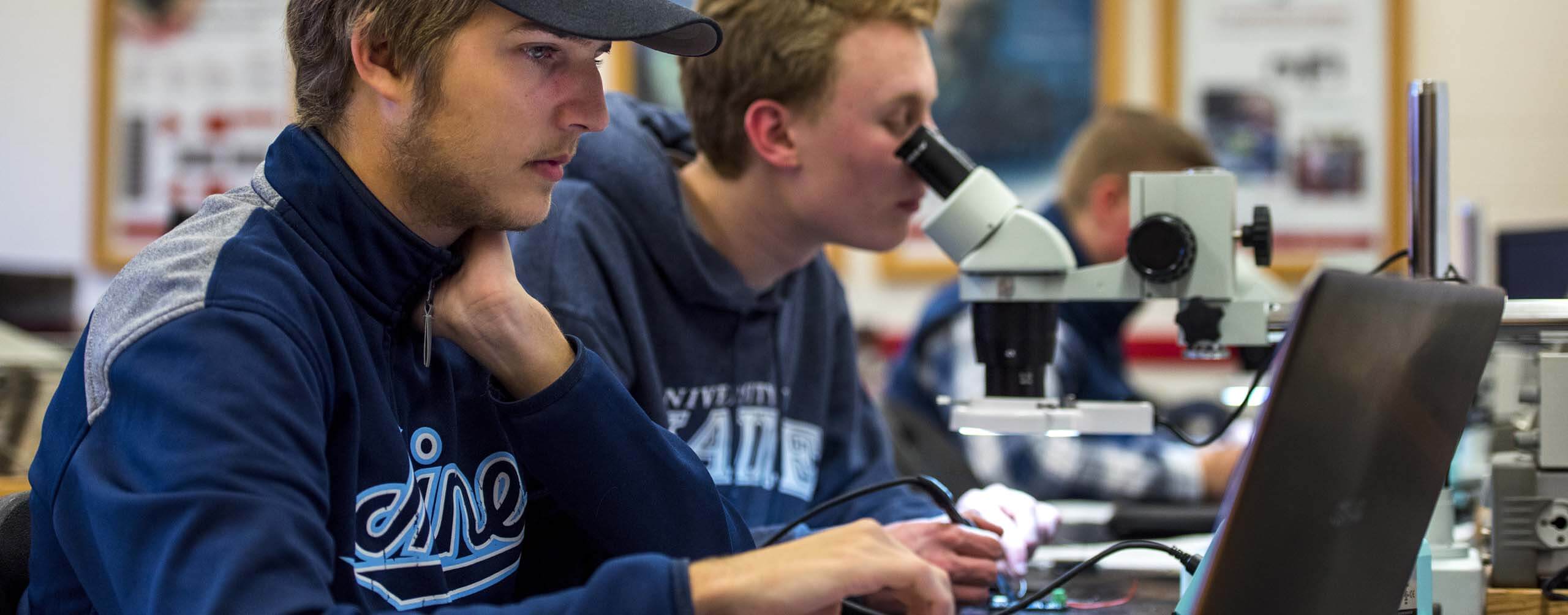
Electrical Engineering
Maine College of Engineering and Computing
Electrical engineering is about being creative and finding ways to improve people’s lives. It is an exciting, challenging, fast-growing profession with abundant job opportunities with high salaries. As an electrical engineer, you’ll work at the forefront of technology to design and build the next generation of cell phones, electric cars, televisions, robots, satellites, microelectronic devices, renewable energy (solar, wind, and ocean) systems, and microelectromechanical machines — pretty much anything that uses electricity. Regardless of where your interests lie (cars, airplanes, music, medicine, biology), you can align them to a career in electrical engineering.
Our department offers Bachelor of Science degrees in both computer and electrical engineering. Electrical engineering focuses on electronics, energy generation and conversion, wireless communications systems and signal processing. Computer engineering centers around computer hardware and hardware/software integration, including digital hardware design, microprocessors, microcontrollers artificial intelligence (AI) and programming in a variety of languages. In computer science, students learn the more formal theory of algorithm design and programming languages.
Electrical engineers contribute to the betterment of society in many ways. Communications systems enable connecting with the wider world. Renewable energy generation improves our environment, and the smart grids increase electric grid reliability. Sensor devices are everywhere, from healthcare to manufacturing, environmental monitoring to making cars and planes more efficient. Semiconductor devices and integrated circuits make them all possible. Our graduates work in industries that include energy, wireless communications, aerospace, biomedicine, nanotechnology, microelectronics, and defense. Our students are in demand. With an average starting salary of more than $68,000, they are among the highest-paid graduates in four-year degree programs.
At UMaine, engineering classes are small. Our programs in electrical and computer engineering (ECE) are ABET accredited. UMaine’s College of Engineering offers a five-year B.S.–M.B.A. degree with the Maine Business School, as well as a minor in engineering leadership and management. Professors with Ph.D. degrees, not graduate students, teach classes. We offer state-of-the-art teaching and research facilities. Undergraduates can do meaningful research alongside faculty and have an impact on society. We have a high placement rate in top graduate programs. Our students are in high demand, and work for industry and the government.
Since 2004, two UMaine ECE students have been named the nation’s Outstanding Electrical and Computer Engineering Student by the Eta Kappa Nu and Tau Beta Pi engineering honor societies. In the last 44 years, only 48 students have received this award, including UMaine’s first Eta Kappa Nu honoree in 1979. Electrical and Computer Engineering undergraduate students from UMaine continue to compete and excel in the IEEEXtreme international programming competition- the largest annual programming competition in the world. UMaine placed No. 1 and No. 2 in the Northeast USA in its inaugural year in the competition (2011). Most recently (2016) a UMaine team had the second highest ranking of all Northeast USA teams.
Our students have the opportunity to work in organizations such as Texas Instruments, ON Semiconductor, IBM, Analog Devices, Kepware Technologies, General Electric and NASA research centers, as well as industries such as pulp and paper and electric utilities.
Electrical Engineering
Maine College of Engineering and Computing
Barrows Hall, Room 101
207.581.2224
